“The Squire of Gothos”
Written by Paul Schneider
Directed by Don McDougall
Season 1, Episodes 18
Production episode 6149-18
Original air date: January 12, 1967
Stardate: 2124.5
Captain’s log. Enterprise is proceeding to Beta VI to deliver supplies, and they’re travelling via a large void between star systems. To everyone’s surprise, a planet appears out of nowhere directly in their flight path. Spock finds it hard to believe nobody charted this before, but they don’t have time to investigate. Kirk orders Uhura to alert the authorities to this new planet, Spock to gather as much data as possible while they fly by, and Sulu to veer forty degrees to starboard.
However, Uhura can’t punch through subspace interference, and Sulu just disappears. Kirk runs over to the helm to see what happened—and he disappears, too.
Spock orders a full stop, the ship to red alert, and a search commenced. Four hours later, there’s no sign of Kirk or Sulu on the ship, and sensor sweeps find no human life on the planet. Ship’s Meteorologist Karl Jaeger reports that the surface of the planet is uninhabitable.
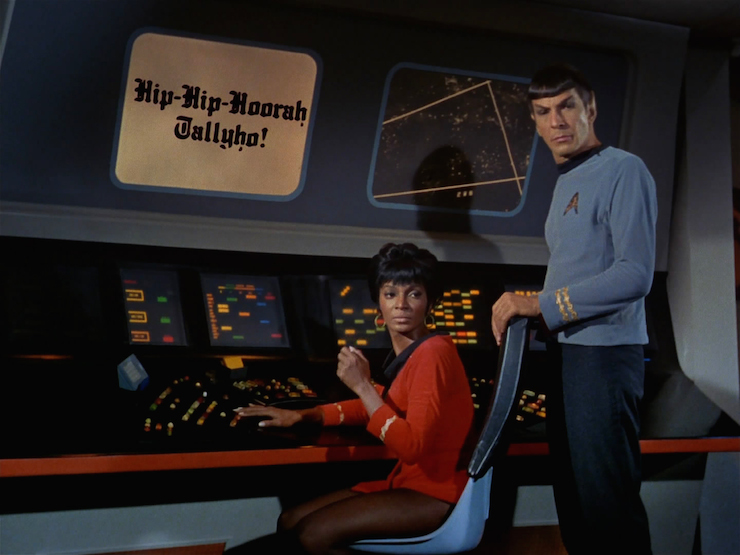
The screen above Uhura lights up with words in a fancy font using archaic wording. Spock authorizes Lieutenant DeSalle to lead a landing party along with McCoy and Jaeger to the source of the signal.
The trio beam down to a verdant forest, completely unlike what Jaeger described, complete with oxygen-nitrogen atmosphere. However, they can no longer communicate with the ship. They do find a large structure that looks like a medieval castle. They enter to find a lushly appointed drawing room, complete with fireplace, candles, tapestries, paintings, and a harpsichord. They also find Kirk and Sulu, frozen in the exact positions they were standing in when they disappeared.
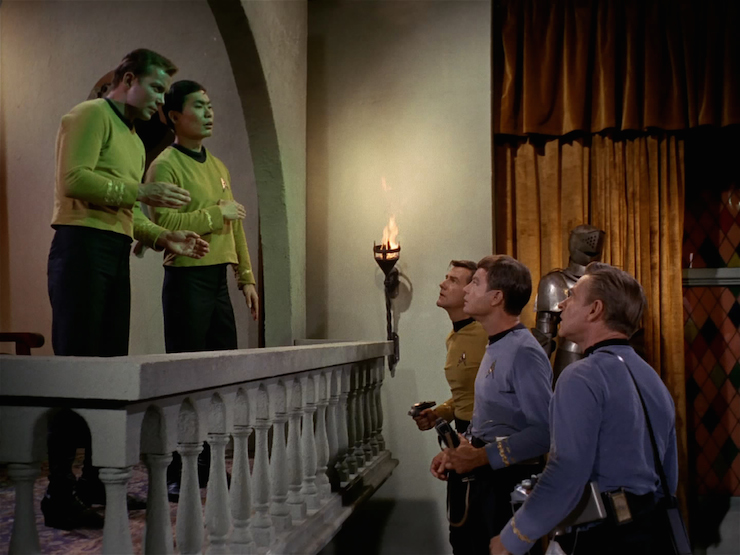
A foppish gentleman appears at the harpsichord. He restores Kirk and Sulu with but a gesture. He calls the planet Gothos, and says he couldn’t resist “summoning” the crew here when he saw the ship pass by. He identifies himself as “General Trelane, retired,” and he’s thrilled to have guests from the planet that he’s made his hobby. Jaeger realizes that the furnishings, costumes, and speech patterns of Trelane are all from Earth’s past—but if he viewed the planet through a telescope, the distance would mean he’d only see older Earth images. “How fallible of me,” Trelane says with regret.
Trelane is fascinated by what he’s viewed of Earth’s history, and wants to know all about their campaigns and battles. Kirk’s insistence that they’re on a mission of peace fall on deaf ears. Trelane is also fascinated by DeSalle’s phaser (he uses it to disintegrate two statues). Everything he owns and discusses relates to battle and warfare.
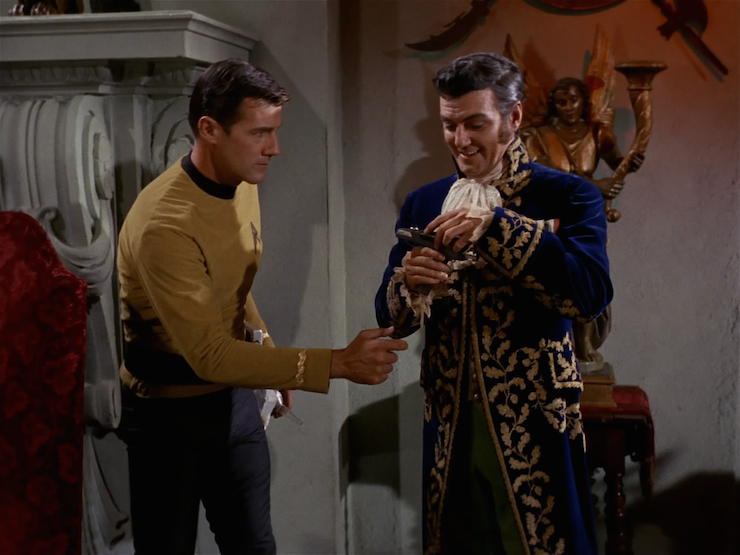
In any case, Trelane wants them all to stay and have dinner with him. To emphasize the point, he sends Kirk to the part of the planet that isn’t under his protection. Kirk almost asphyxiates before Trelane brings him back.
McCoy reports that he detects no life signs of any kind from Trelane, while Jaeger points out that the fire doesn’t actually radiate any heat. Kirk tries to convince Trelane to let them go by appealing to his sense of duty, but Trelane won’t hear of it. Kirk pushes, saying that there are over 400 men and women on board—but the only word Trelane hears is “women,” and he’s fascinated by the notion of “the fairer sex” serving aboard ship.
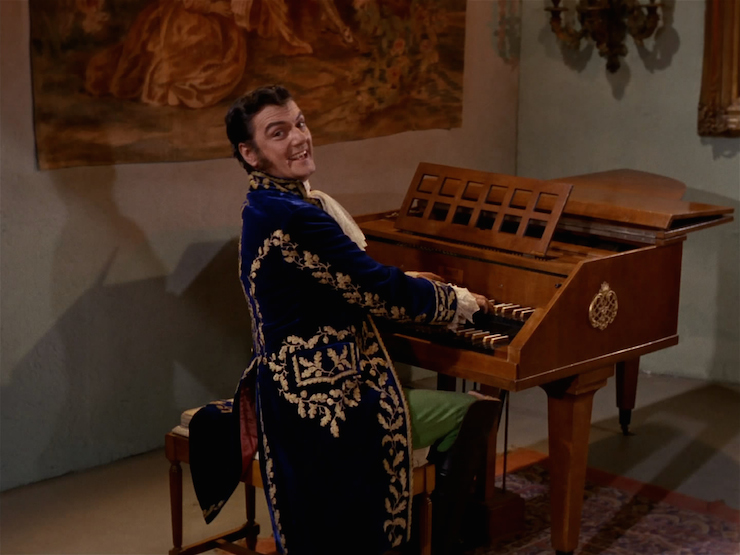
On the Enterprise, Scott is able to fine-tune the sensors to detect Trelane’s little oasis. Spock orders him to beam up any life signs they might find. The landing party is safely whisked away, to Trelane’s annoyance, and Kirk orders the ship to leave the planet at maximum warp.
Trelane appears on the bridge, says he forgives Kirk for his rudeness, and transports everyone on the bridge—Kirk, Spock, McCoy, Jaeger, Sulu, DeSalle, Uhura, and Yeoman Teresa Ross—to his dining room. However, the food and drink have absolutely no taste to them. Trelane knows only form, not substance. Kirk and Spock hypothesize that he has assistance in doing all his little magic tricks, probably mechanical.
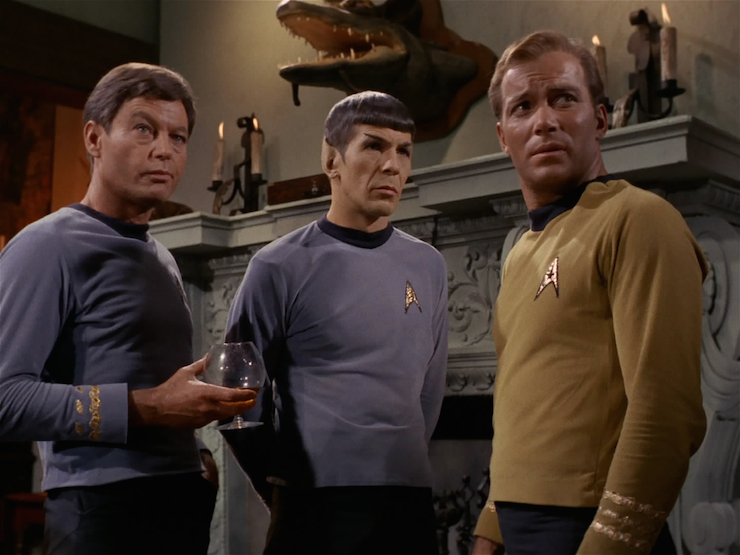
Trelane forces Uhura to play the harpsichord and he then dances with Ross, going so far as to put her in a ballgown. Kirk decides to go along with Trelane’s play-acting, and acts as the jealous lover, pulling Ross away from him and objecting to Trelane dallying with her. He removes one of the gloves from Ross’s gown and uses it to slap Trelane, challenging him to a duel.
To Kirk’s surprise, Trelane chooses to shoot first, but fires harmlessly into the ceiling. When Kirk takes his shot, he fires at the large mirror that Trelane is always standing in front of. The machine behind it explodes, the fire in the fireplace goes out, and DeSalle can contact the ship now. Trelane is furious, and tells Kirk to go back to his ship—and that he’s earned the wrath of the squire of Gothos.
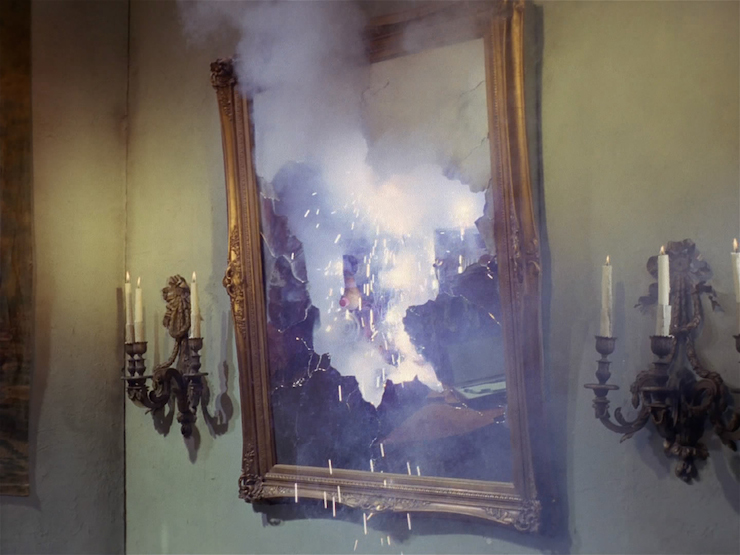
And then Trelane disappears, which worries Kirk, as this means he still has some power left…
They beam back to the Enterprise and Sulu floors it. However, everywhere they go, Trelane shoves Gothos in their path. They can’t get away from it. Fed up, Kirk decides to beam down alone—but before he can even reach the transporter room, he finds himself in a courtroom. Trelane is the judge, complete with robes and white wig. Trelane declares that Kirk is guilty and that he will hang until he is “dead, dead, dead!”
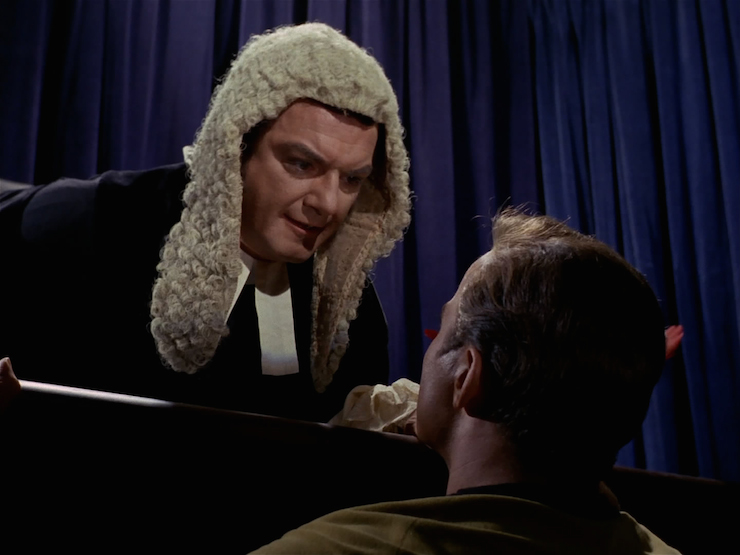
And then Trelane is giddy as a schoolboy—he’s never been angry before, and he rather enjoyed it. But the act of actually killing Kirk is too easy. Kirk convinces him that it can be much more fun to kill someone if there’s suspense and terror involved, rather than just forcing Kirk to put his head in a noose. Trelane agrees to a game of hide and seek, where Trelane will hunt Kirk through the forest.
Kirk leads Trelane on a merry chase through the trees, and Kirk even manages to get Trelane’s sword away from him—though the squire simply creates a new one for himself. Eventually, however, Trelane traps Kirk and orders him to his knees. Kirk refuses to, and Trelane gets furious.
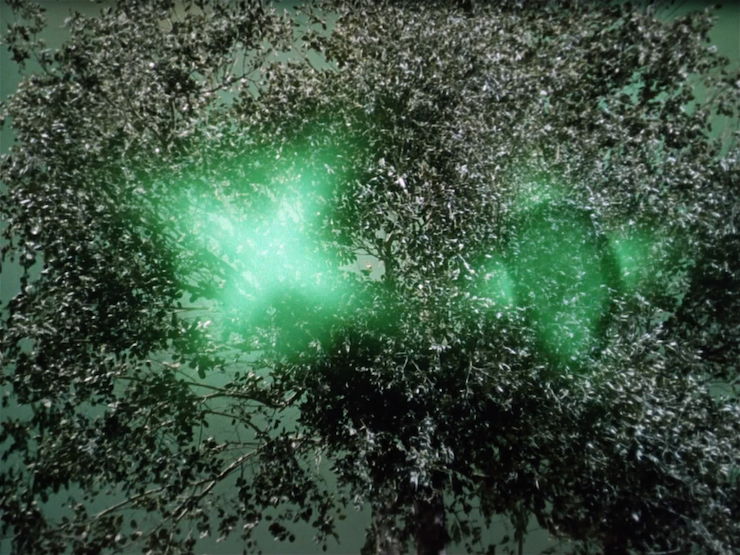
Before the conflict can continue, Trelane’s parents show up and tell him it’s time to come in now. Trelane insists that they promised he could have that planet and do what he wanted! But his parents do insist, and take him away. The parents apologize to Kirk, saying it’s their fault for indulging him too much, and then they all disappear.
The Enterprise proceeds to Beta VI.
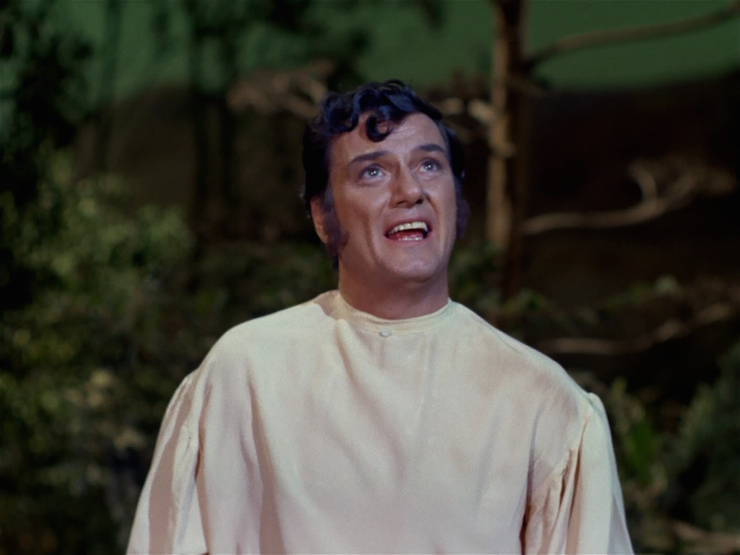
Can’t we just reverse the polarity? Trelane and his people have the ability to change matter into energy and back again, and can also alter the forms that both the matter and the energy take. Trelane needs his “instrumentality” to accomplish his goals—it’s unclear if his parents (who appear as green glowy blobs) need the same.
Fascinating. Trelane at one point declares that Spock’s one saving grace is that he’s ill-mannered.
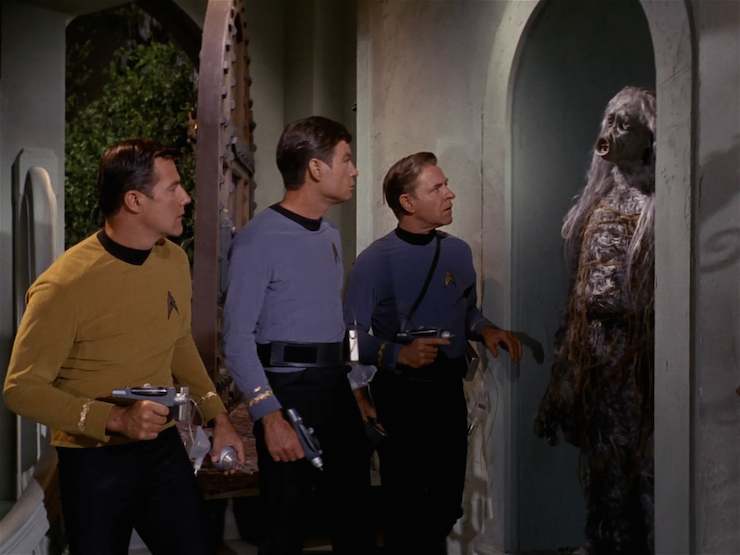
I’m a doctor not an escalator. McCoy can determine no kind of life readings from Trelane whatsoever—leading Sulu to ask if he’s dead, but McCoy says it’s more like he isn’t there at all. Having said that, he gets a similar reading on Kirk and Sulu before Trelane unfreezes them.
Trelane also has a statue of the salt vampire from “The Man Trap,” the sight of which causes a double take from McCoy…
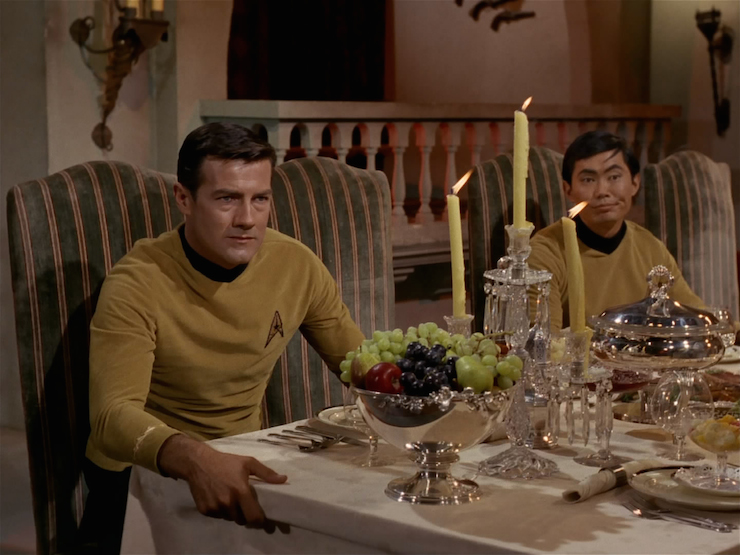
Ahead warp one, aye. Sulu has one of the best lines of the episode when Trelane transports the bridge crew to his dining room and asks if the décor is more appropriate and tasteful. Sulu just stares at him, smiles, and says, “No.”
I cannot change the laws of physics! Scotty points out to Spock that just beaming up whatever’s in that oasis is a shot in the dark, but Spock says the alternative is to do nothing. The spectacular danger of beaming something onto the ship without knowing what it is fails to be brought up by either of them.
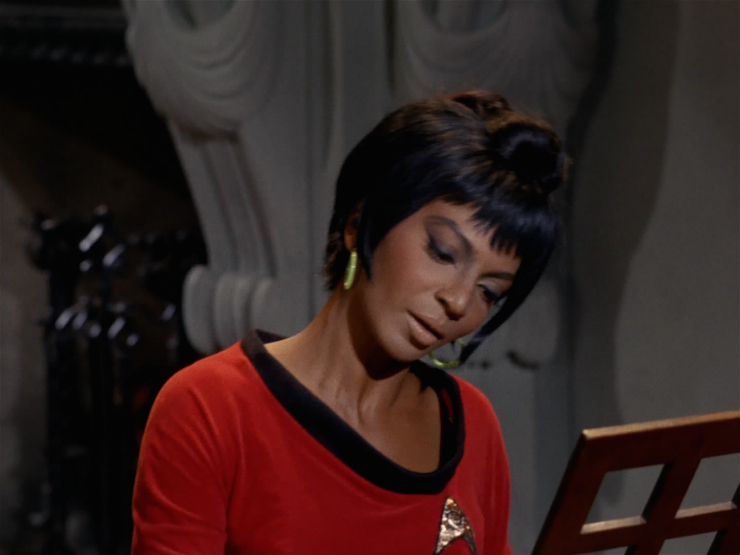
Hailing frequencies open. Although she’s obviously nauseated by Trelane’s “Nubian princess” line, Uhura does enjoy playing the harpsichord for the first time.
No sex, please, we’re Starfleet. Ross looks rather fetching in her gown. After they return to the Enterprise, Kirk jokes with her to turn in her glass slippers and get back into uniform. Once she goes off to change, Kirk gets a she’s real purrrrrrty look on his face.
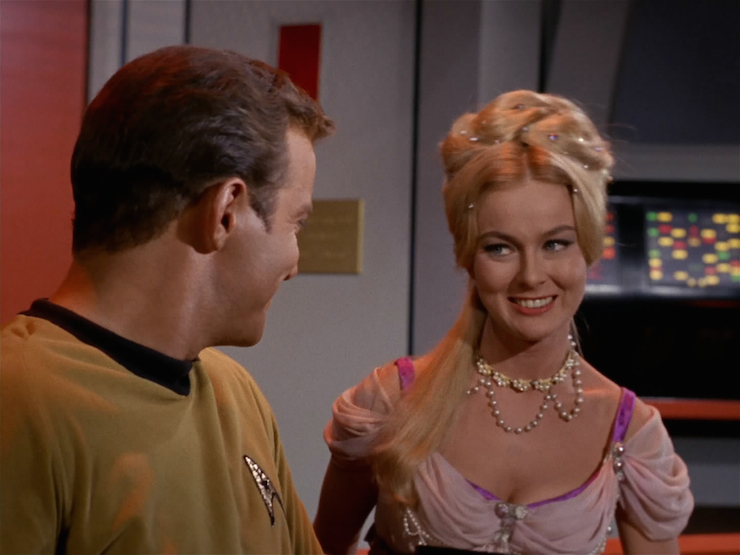
Channel open. “‘Fascinating’ is a word I use for the unexpected. In this case, I should think ‘interesting’ would suffice.”
Spock discussing his semantic choices with McCoy.
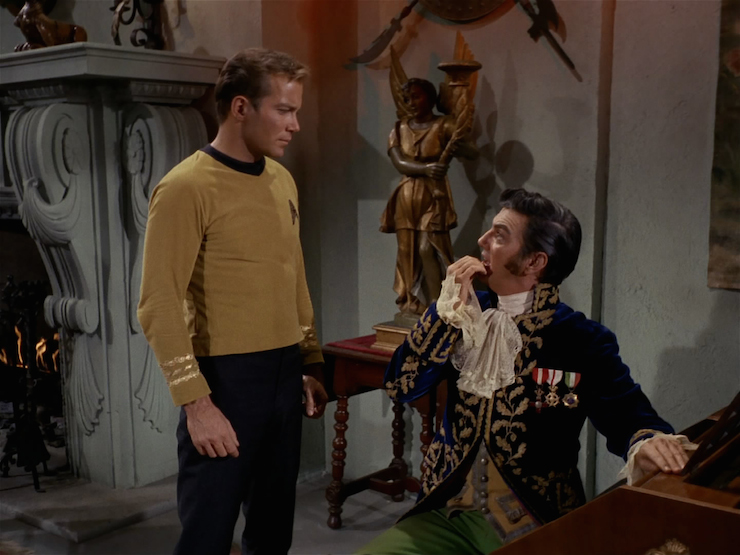
Welcome aboard. William Campbell plays Trelane, the first of two appearances by the actor on the series; he’ll return in season two’s “The Trouble with Tribbles” as the Klingon Koloth. Michael Barrier makes the first of three appearances as DeSalle; he’ll be back in “This Side of Paradise” and “Catspaw.” The latest member of the post-Rand yeoman derby is Venita Wolf as Ross, while Richard Carlyle plays Jaeger and Eddie Paskey plays Leslie (Leslie has no lines, but is sitting in the captain’s chair at one point before being relieved by Kirk, despite Uhura being right there; as progressive as the show was, they still weren’t about to put a black woman in charge of the ship…). Recurring regulars DeForest Kelley, Nichelle Nichols, George Takei, and James Doohan are all present and accounted for, as well.
In addition, Bart LaRue and Barbara Babcock make uncredited vocal appearances as Trelane’s parents.
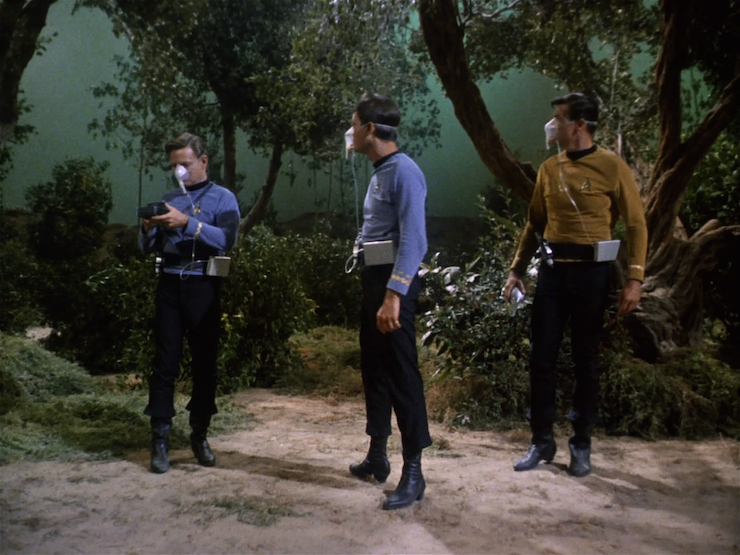
Trivial matters: Star Trek deliberately avoided specific references to when it took place, though this is the closest they’ve come to an overt reference so far, as Jaeger identifies Trelane’s outfit and furnishings as being from 900 years in the past—based on the planet being 900 light-years from Earth—which would put Trek in the 27th century, since Trelane’s accoutrements are all 18th/19th century.
Trelane’s harpsichord is playing two pieces by Domenico Scarlatti, and later Uhura plays “Rosen aus dem Süden” by Johann Strauss, to which Trelane and Ross dance. The pistols he brings out for the duel are apparently the same as those used in the duel between Alexander Hamilton and Aaron Burr in Weehawken, New Jersey.
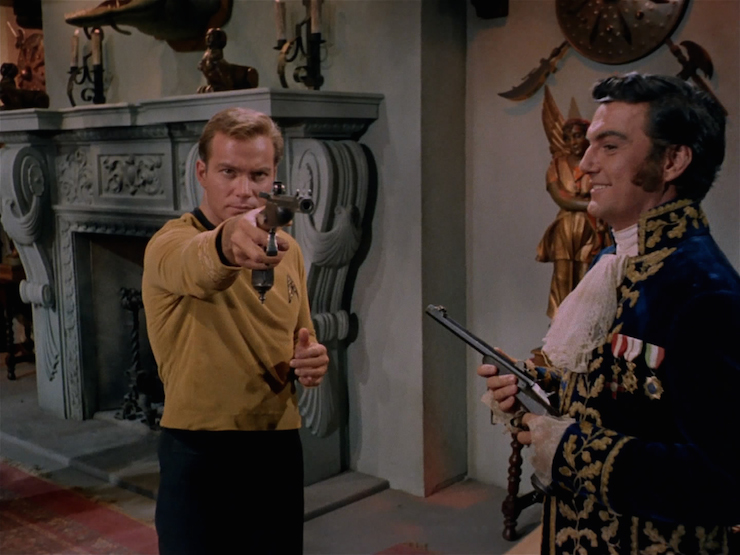
A popular fan theory was that Trelane was a member of the Q-Continuum, as introduced in “Encounter at Farpoint” and seen throughout TNG (as well as DS9 and Voyager), despite the fact that Trelane needs technology to help him out, unlike any member of the Q we ever met. Despite that, Peter David wrote the novel Q-Squared, which paired Q and Trelane.
Trelane also appeared in the videogame Judgment Rites (voiced by William Campbell), the 45th issue of DC’s first Star Trek monthly comic by Steven H. Wilson, Rob Davis, & Arne Starr, and in Marvel’s Star Trek Unlimited #7 by Dan Abnett, Ian Edginton, Ron Randall, Tom Morgan, Art Nichools, & Scott Hanna.
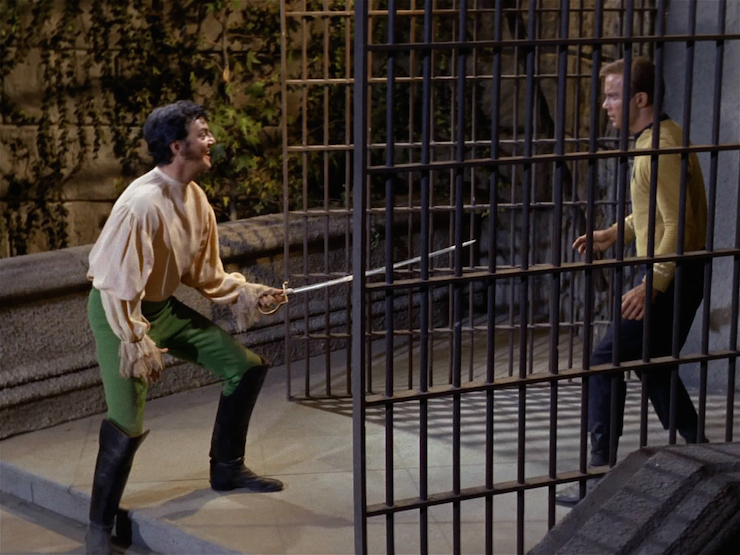
To boldly go. “Are you challenging me to a duel?” The lighter side of “Charlie X,” this is another case of a child being given absolute power, but Trelane isn’t a character we feel even remotely sorry for as we do Charlie Evans. Part of that is because it’s obvious that Trelane is supposed to have this power, he’s just a big ol’ brat.
Not that we have to feel sorry for him. Instead, we can just enjoy the ride as he acts like a buffoon. The eye-rolling engaged in by Sulu, Jaeger, DeSalle, and Uhura as Trelane throws ethnic stereotypes at them is a delightful deconstruction and repudiation of those same stereotypes. And William Campbell is generally having so much fun in the role that it’s very easy to just go along for the ride. The revelation that Trelane is just a child puts the entire episode into focus, as it explains how mercurial he is, not to mention how easy he is to manipulate. When Kirk talks Trelane out of hanging him by the noose, the first thought is that it’s the sort of thing only a child would fall for—but Trelane is a child.
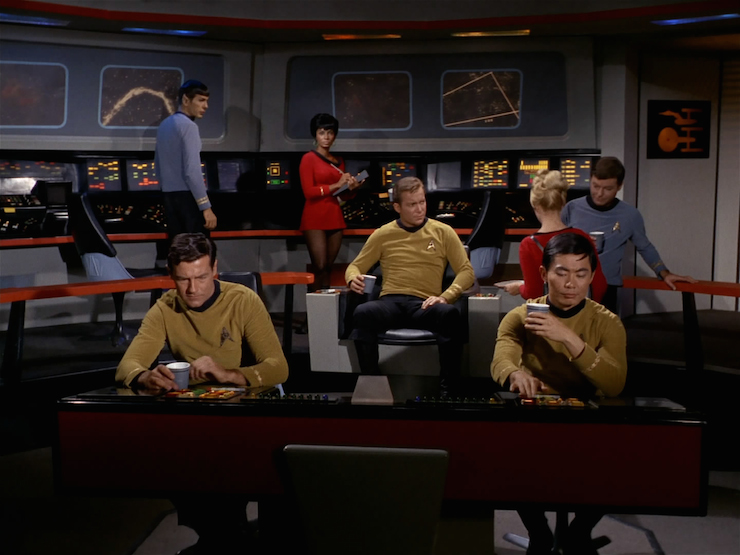
Indeed, the episode’s only true flaw is how thick they lay on the parent-child thing at the end. Suddenly, Trelane is speaking exactly like a human four-year-old, and it’s a little too on the nose.
Still, the episode is a comic delight, from Campbell’s prancing about to William Shatner’s tense calm holding everything together to Leonard Nimoy’s dry recitation of Trelane’s initial greeting. And the episode is another that makes good use of the greater ensemble. I would’ve liked to have seen more landing parties involving junior officers like the one DeSalle led that included Jaeger and McCoy.
Warp factor rating: 8
Next week: “Arena”
Keith R.A. DeCandido is involved with two nifty Kickstarters, one for a superhero anthology called The Side of Good/The Side of Evil (in which Keith will have a story), the other for a web series that combines 50s and 60s pulp sci-fi with a modern sensibility (think Buckeroo Banzai meets Emma Peel) starring Singularity & Co.’s Cici James called Atomic Annie (for which Keith will be putting together a short-story anthology).










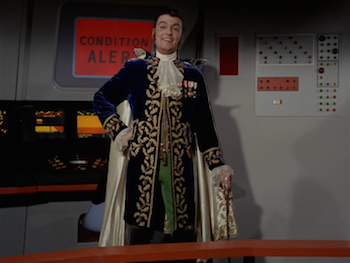
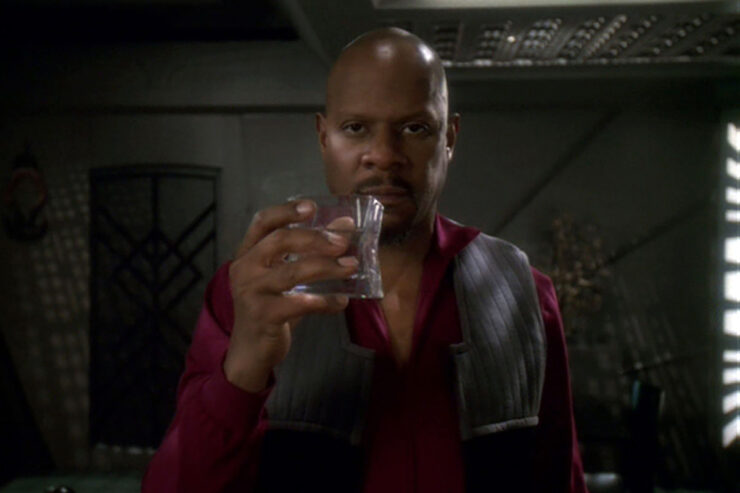
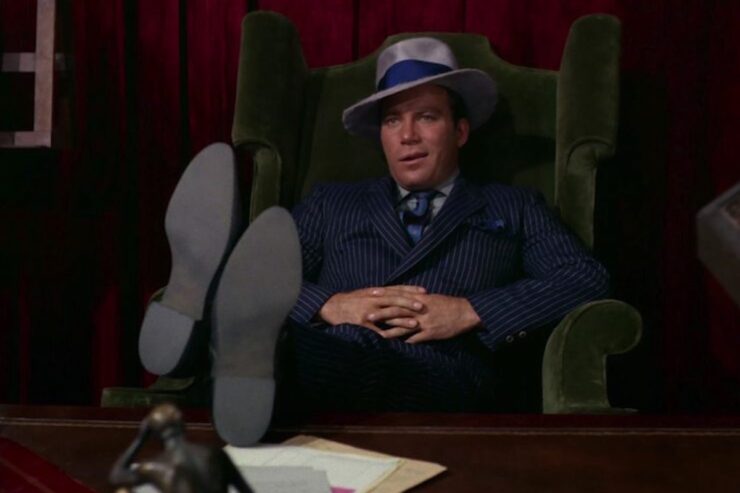
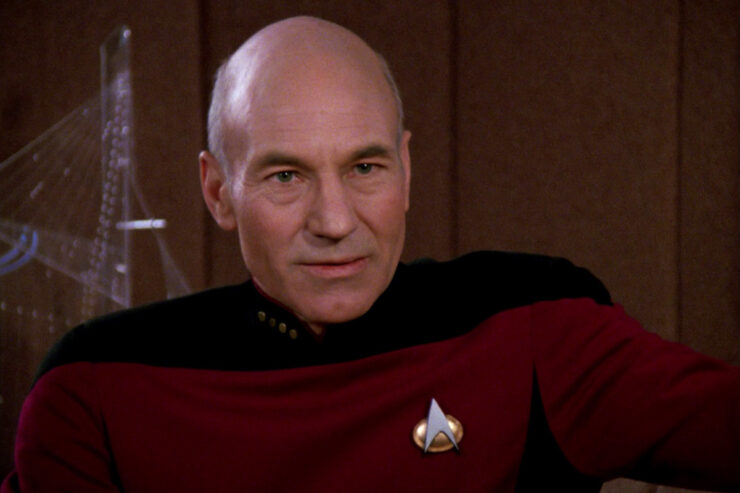
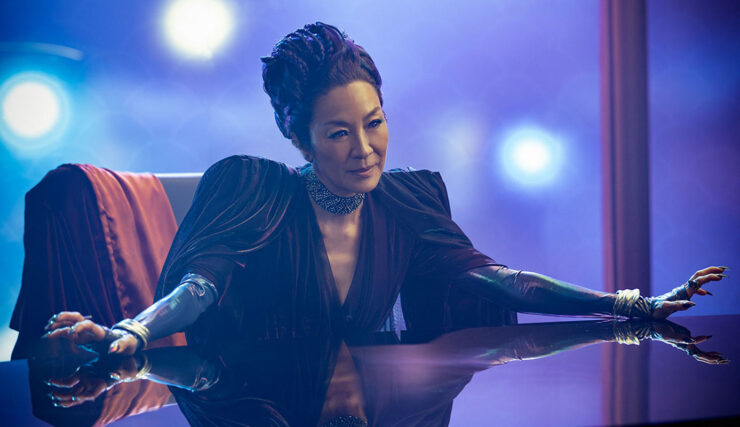
It seems pretty obvious that the reason Trelaine was retconned–by fans and the David novel–as a Q is that “Encounter at Farpoint” is so similar to this episode. (A high school classmate of mine, who was less than impressed with TNG, complained that Q was a ripoff of Trelaine.) Not only are the personalities similar, but so are the philosophical themes (the alien reminding us of humanity’s evils, and the captain protesting that we’ve evolved). Certainly, both Campbell and DeLancie give tour-de-force performances.
However, as you underlined, there’s a crucial difference: Trelaine needs machinery. It’s possible that the Q technology improved just as Federation technology did, but I propose another retcon: Instead of the Q continuum, could Trelaine be an ancestor of Ardra from “Devil’s Due?” I find that pairing to be a more precise analog.
This episode also seems to me to have elements of the short story “The Most Dangerous Game,” as well as the Dr. Who episode “The Celestial Toymaker.”
Arda was an entirely biological and non-superpowered being — basically a pirate, who had a spaceship in orbit that performed mechanical tricks that she signaled by means of eye blinks and such. I think she had a more advanced version of google glass, but that’s all. Trelane is at least a partially superpowered something or other. Maybe the instrumentality was his people’s equivalent of training wheels or a wheelie walker — help the tyke along until he can stand on his own two feet.
Interesting idea (about the “training wheels”), StrongDreams. Certainly, there’s one other similarity between Trelaine and Q: both are reigned in (though Q less so, since he’s an “adult”) by other members of their race.
Great review, as always.My thoughts:
Pure delight.This was one of my favorites as a kid, and I’m quite pleased to see that it still holds up as an adult.
My grade: 9
“The eye-rolling engaged in by Sulu, Jaeger, DeSalle, and Uhura as Trelane throws ethnic stereotypes at them is a delightful deconstruction and repudiation of those same stereotypes.”
My thoughts exactly.Indeed, as I pointed out in the “Shore Leave” review, it’s quite interesting to note how this episode comes directly after “Shore Leave” (with its “Stage Irish” Finnegan).The perfect counterpoint, as it were
What could have been: Apparently Roddy McDowell was considered for Tralane. Of course, Campbell is so good in the role that it’s hard to imagine anyone else….but if it had to be someone else, McDowell would have been perfect.
Rand stand-in: I can’t help but think that the very lovely Venita Wolf’s Ross was another example of a part that was originally intended for Rand.
DeSalle: I quite like how they managed to make him hotheaded but not unbelievably so.
Favorite bit: Gotta go for the obvious one.Kirk’s duel with Trelane. Shatner is simply superb, and Campbell plays Trelane just right (i.e., he shows child-like glee and peevishness but not in an OTT way)
Least favorite bit: Don’t really have one.
I always thought that Trelane was similar to Apollo. Both needed a machine to use their power, although Apollo appeared to be an adult in behavior.
I have absolutely seen kids turn into petulant whiners when a parent shows up to tell them something they don’t want to hear. It was on the nose because it’s straight-up legitimate – Trelane is that child.
I hadn’t seen this episode until last night ( about 25 episodes backlogged on PVR ), and it was my “one more episode” simply because we had recently watched Encounter at Farpoint on Netflix.
I knew about the Trelane/Q fan theory, and it’s hardly surprising, since Roddenberry often seemed to regard TNG as a remake as much as a continuation. I don’t doubt that John deLancie drew inspiration for Q from William Campbell’s performance here. My wife did not know about the theory, and exclaimed “He’s Q!”
Honestly, I’ve never much liked this one. Trelane is an annoying brat. I’ve never found William Campbell’s performance all that engaging, either here or as Koloth. If they had gotten Roddy McDowall, I surely would’ve liked it a whole lot better, since he could elevate anything. But Campbell’s Trelane is just obnoxious and petulant.
And the episode is a conceptual mess. Even aside from the chronological problems it created with regard to what other episodes established, the idea that Trelane is observing Earth using lightspeed-limited methods from 900 light years away is deeply problematical. If he’s limited to optical/EM sensors, how does he get such incredibly detailed resolution? How does he see inside buildings? How does he know what harpsichord music, or spoken English or French or German, sounds like? If his sensors are magical enough to detect all that from nearly a thousand light years away, it’s absurd that they don’t operate faster than light, given that much more primitive Starfleet sensors clearly do.
Granted, lots of TOS episodes needed to concoct contrived excuses to have aliens in space using historical props and costumes from Desilu’s warehouses, but this is one of the flimsier excuses.
It’s also a very superficial episode, without any real theme or idea underlying its antics, aside from the “gotcha” twist that the superpowerful alien was just a small child. Sure, maybe there was an undercurrent of how humanity had overcome its warlike and prejudiced past, but that didn’t really build up to anything where the core story was concerned. And if the intent was to play it for humor, then it was inconsistent and largely unsuccessful. Perhaps the most wince-inducing moment is when Kirk blows out the mirror machine — a super-powerful artifact of an incredibly advanced science — and it makes comedy “boing” noises. What the hell were they thinking?
And while there are other episodes where the crisis was resolved by the intervention of super-advanced aliens — “Errand of Mercy” being a prime example — usually Kirk says or does something that makes a difference to their decisions, even if it’s just forcing their hand in the case of “Errand.” In “Squire,” all Kirk does is evade the noose until Trelane’s parents just happen to come home from the hyperdimensional movies or whatever and send their kid to his room.
@1/Don S.: I agree — given Trelane’s clear dependence on tech, and the clear limitations on his abilities, there’s no reason at all to associate him with the Q, except that the characters are written and played similarly. And yes, the Q subplot that Gene Roddenberry tacked onto D.C. Fontana’s “Encounter at Farpoint” pilot script was very derivative of this. The main difference, to me, is that John DeLancie actually had the charisma to make such a petulant and obnoxious character entertaining.
jj
@8 Christopher L Bennett:”Granted, lots of TOS episodes needed to concoct contrived excuses to have aliens in space using historical props and costumes from Desilu’s warehouses, but this is one of the flimsier excuses.”
Hey, compared to” Miri,” it’s a masterpiece of logic.I mean, we do, at least, get some kind of answer.
“the idea that Trelane is observing Earth using lightspeed-limited methods from 900 light years away is deeply problematical.”
He clearly isn’t. The MARVEL no-prize answer? Whatever he’s using, he’s a kid and he just screwed up.He set his trans-warp,trans-temporal, trans-spatial sensors for the ST present, and ended up getting (mostly) early 19th century Earth: Alexander Hamilton, Napoleon, etc.
@9/trajan23: Sure, but there’s a difference between what a fan can rationalize after the fact and what the writer clearly intended. That’s what I focus on — the thinking behind the story, the coherence of it as a concept. The dialogue makes it clear that Paul Schneider’s assumption was that Trelane was using lightspeed detection methods and that was why his observations were anachronistic. And that’s an idea that falls apart when you examine it. The fact that it needs to be rationalized and retconned means that it’s flawed in itself. And that conceptual flaw has always bothered me and is one of the reasons I’ve never much liked the episode.
One of the earliest hours of Trek I’d seen. And one of the funniest back then. No wonder this was the inspiration for Futurama’s Melllvar. All we needed was the Scotty death scene from Adonais, plus a shot of Kirk’s ripped shirt, and we’d have the entire parody recreated.
I like to think this held up well, but it’s mostly thanks to Campbell’s performance (and I liked him better as Koloth, anyway). Plot-wise, it’s not even worth it. It’s basically a play. A fun one, nonetheless. It’s the ending that kills me everytime. On paper, the concept that we’re dealing with an overgrown child that requires parental intervention sounds ridiculous. And yet, it works. Not as effectively as Charlie X, but it still does. You couldn’t write this any other way than a straight-up comedy, which is what it is.
And, character-wise, I can see why people would associate him with Q, especially Farpoint Q, whose tendencies towards costume fetish definitely make him stand out. There’s a distinct difference, though. Q may be playful in a childish way himself, but he takes his power and responsibility as a member of the continuum very seriously, as we find out on True Q.
On a purely shallow note, was Venita Wolf the best looking woman to ever appear on TOS?
@10 Christopher L Bennet:”Sure, but there’s a difference between what a fan can rationalize after the fact and what the writer clearly intended. That’s what I focus on — the thinking behind the story, the coherence of it as a concept. The dialogue makes it clear that Paul Schneider’s assumption was that Trelane was using lightspeed detection methods and that was why his observations were anachronistic. And that’s an idea that falls apart when you examine it. The fact that it needs to be rationalized and retconned means that it’s flawed in itself.”
Yeah, but a lot of the science in STAR TREK needs that kind of rationalization. Humans/humanoids everywhere you look in the Galaxy? Uhh, sure, the Preservers were behind it all.The Enterprise having FTL-Warp sensors.Did they ever provide a rationale for that in the Original series? Did the writers even know that that’s what the Enterprise had to have, given what we’ve seen it doing?Beaming technology.Did Roddenberry ever really think what that meant, in terms of Federation technology?In terms of what that meant the Enterprise should be able to do (manufacture anything). Pretty clearly not, as he seems to have put it in as a cost-cutting measure (beaming down is cheaper than landing vehicles).
Frankly, incoherence is the order of the day in terms of STAR TREK science.
@13/trajan23: All of those, along with all the Earth-parallel worlds, were compromises made for dramatic, logistical, or budgetary reasons, choices that served an understandable purpose. This was in a similar vein — an excuse to use historical paraphernalia on hand at the studio — but it was a weak justification. Not the only one, to be sure, but I’m not crazy about the other episodes that use weak justifications for it either. I’ve expressed how much I hate “Miri.” I’m not a fan of “Bread and Circuses.” I think “A Piece of the Action” is fun but I have reservations about its premise. And so on. So just because other episodes have used weak excuses, that doesn’t somehow compel me to like this one.
#8
This episode is more important than you may have realized. It depicts an obnoxious, petulant man-child-child-man using technology to torment others with racial stereotypes, and uses straw man historical references to justify his behavior. And with that, Star Trek predicted the internet troll!
The Squire of Gothos is a treasure.
One note about the “900 year” figure is that it was apparently something of a known mistake even at the time; De Forest Research (the fact check firm that Roddenberry used at the time) called the script out for that number not matching up with any of the occasional year references that had been in Trek up to that point.
George Kaplan, you just made me snarf my iced tea! Bravo!
—Keith R.A. DeCandido
#17
Haha, glad you liked it. By the way, I’ve been enjoying these recaps. Keep up the great work, Keith!
For some reason I had thought that James Doohan was the voice of Trelane’s father.
I first became aware of the Q/Trelane reference from Peter David’s book. But then when I watched this episode again, I noticed the technology thing, and you also mention how his creations have form but no substance, whereas Q’s creations are said to be entirely real. Also, there’s the fact that he doesn’t know his knowledge of Earth is out of date, and even though Q throws stereotypes of earlier periods at the Enterprise crew, he seems to have a rhetorical point to it and is willing to adapt his appearance to their current era. So this is an instance where perhaps people need to forget about the similarities and focus on the differences.
Although it’s hardly the only fan theory that doesn’t quite fit.
I approve of this rewatch. It would be ill mannered not to.
Keith wrote: “Trelane also appeared in. . . the 45th issue of DC’s first Star Trek monthly comic by Steven H. Wilson, Rob Davis, & Arne Starr”
It was actually DC’s SECOND Star Trek monthly comic.
And it was a darned good issue, too! :-)
Surely Q is the grown up Trelane, with no parents to rein him in? haha
More seriously, I view this episode as a comedy- and rules are generally relaxed for comedies, therefore I can just relax.
@8/Christopher: I may be wrong (since I don’t read behind-the-scenes books), but I don’t think that the reason for the 18th/19th century stuff was “using historical props and costumes”. I think Paul Schneider picked that era on purpose, because it was the heyday of European war glorification and imperialism, when chemical warfare hadn’t been invented yet, uniforms still looked cool, and little boys were encouraged to play soldier.
And then he ridicules this world-view. I don’t think that it’s inconsistent or unsuccessful, I think it’s brilliant – lighthearted and fun and antimilitaristic and anti-ethnic stereotyping, all at the same time. It’s one of my favourite comedy episodes (the other one being A Piece of the Action). I really wish there had been more episodes by Paul Schneider.
Also I don’t agree that Kirk only evades the noose until Trelane’s parents come home. My reading of the next-to-last scene is that he tries to show Trelane that killing isn’t fun. But I admit that it’s ambiguous, we don’t know what Trelane would have done if his parents hadn’t shown up. My guess is that he wouldn’t have done anything. Kirk would simply have beamed away. But of course we don’t know that.
My favourite line: in the last scene, when Kirk suggests to classify Trelane first as “God of War” and then as “a small boy”. What a combination!
The 900 year problem, already commented on, was pointed out to me by my brother when we were kids first watching Star Trek in syndication. Scarlatti lived in the 1600s-1700s. The Strauss waltz, on the other hand, was written in 1880. Even if you figure that the 900 year figure was just wrong, and you suspend the disbelief of the issues Christopher Bennett raised (@8, in which I’m thinking specifically of how Trelane knows what Earth music sounds like), you still have a big time problem. Either Trelane was actually looking into Scarlatti’s time period, in which case Strauss hasn’t been born yet, or he was looking into Strauss’s time period making other things, notably the harpsichord, an anachronism of the chosen time period (it should have been a piano, also ignoring that the waltz is for orchestra). Yes, I’m nitpicking, but hey, I’m a sort of classical music geek. (I missed my chance to make a classical music nitpick comment in “Sarek” during the TNG rewatch and I’m making up for lost time.)
@23/Jana: Reusing historical stuff from the studio warehouses was part of the blanket mission statement of the series. Making a show set in outer space was expensive, since anything alien had to be made from scratch. So a key part of how Roddenberry convinced Desilu and NBC that the show would be affordable was by incorporating the conceit that the crew would frequently come across Earth-duplicate worlds of one sort or another, enabling the production to reuse existing materials. Any episode that involves aliens recreating things from Earth history for any reason is part of that same money-saving dynamic, whatever the specific considerations that went into the story otherwise. I’m sure that the show’s freelance writers were invited to try to think of story ideas that would tie into Earth history in some way. And even if that hadn’t been part of Schneider’s thinking in coming up with the story, it was probably part of the producers’ thinking in buying it, since they knew the focus on Earth history would make it more affordable than a premise set in an entirely alien environment.
RichF: Hey, c’mon, you can still comment on the “Sarek” rewatch. It’s still there….. :) Besides, I’m curious as to what your classical music nitpicks are in the episode……..
—Keith R.A. DeCandido
@26/Christopher: Yes, I remember your post from the Miri rewatch. I should have written: I don’t regard this story as “one of the flimsier excuses” for using historical costumes – I think the 18th/19th century is the perfect setting for the story Schneider wanted to tell.
For whatever reason I just found this episode mostly dull. Having not seen it until after reading Q-Squared, I might have been expecting too much. “Oh, this is the episode that has Trelane! It must be amazing!”
And then I was totally confused that he (sort of) needed a machine.
I think episodes like this are a good argument for adding new categories or counters to the rewatch. Seems like it would be worth tracking the number of times an omnipotent entity messes with the crew, the number of times Kirk talks a computer into blowing itself up, the number of unbelievably exact duplicates of Earth they run into, etc.
-Andy
@29/AndyHolman: I think the number of times Kirk convinces a computer to self-destruct is 3 – The Return of the Archons, The Changeling, and The Ultimate Computer. The number of omnipotent entities may be a little higher…
@28/Jana: That’s a good point. I guess I’m saying it’s flimsy from a technical standpoint. Having him interested in 18th-century Earth is fine, but having him not realize that his observations are limited to the speed of light just doesn’t make sense as a justification for that. If he were only using optical/EM detection, there’s no way he’d get that level of detail. So it would’ve been more believable if he’d been interested in that period by choice, if he’d had some kind of time viewer for looking into the past and had chosen that particular period because the glorification of violence attracted him. Or maybe he’s only gotten that far in his study of Earth history, has stopped his studies there because he’s so in love with the period, and hasn’t realized how much humanity has changed since then. That would’ve made the point better than just having him stumble upon that period by accident.
Ok, Keith – I posted it. The real reason Sarek cried. :-)
@26 Must be the same policy on sets & costumes in Britain, as well. Look at how many DOCTOR WHO serials are set in Victorian England, given the BBC’s propensity towards dramatizing novels from that era.
@33 I gather that at least one of those Victorian serials (The Talons of Weng-cheng) was set then so they could mine Victorian adventure fiction for tropes. I expect most of them have the same motive.
On a slightly similar note, the audiance would have had a different reaction if Trelane had dressed up from some other period – as General Patton or an SS Brigadefuhrer, for example. Picking the 1800s gives you a period close enough for the people to seem familar, without the emotional reactions people have to more recent wars.
Incidently, note that no one from Europe in 1800AD would describe Uhura as Nubian – but an ancient Egyptian might. I speculate that Trelane does not realise his toys have shown him bits of different periods of Earth history – and the Enterprise crew don’t have enough knowledge of history to work it out for themselves. They just see things from their distant past, and assume Trelane is using speed-of-light sensors.
@34/ad: The term “Nubian” has been commonly used in European literature in recent centuries. Examples here include quotes from Dumas, Disraeli, Verne, Wilde, and others. After all, Europeans have been romanticizing ancient history for hundreds of years. Remember, Trelane also quoted Marlowe’s poetic reference to Helen of Troy, “Is this the face that launched a thousand ships/And burned the topless towers of Ilium?” That doesn’t mean he was seeing the Trojan War, just that he was aware of more recent literary references to it.
(Also, of course, the Nubian ethnic group and culture still exists today in Sudan and Egypt, though Trelane was mistaken to use the term for the Bantu Lt. Uhura.)
@31/Christopher: That’s true. Though I like it that Trelane believes the Enterprise crew to be contemporaries of the people he watches. But I can imagine that in your second scenario too – have him stop his studies and then forget or never realize that he didn’t get the whole story.
@11/Eduardo – Q uses costumes constantly, not just in Farpoint – but hey, if I could change clothes with a snap of the fingers, I’d cosplay all the time too…
(Actually, now that I think of it, “Deja Q” may be the only time Q isn’t wearing a costume.)
@32/RichF – I just read your comments on the music in “Sarek.” Masterfully done and very entertaining!
You know, the more that I think about it, the more serious this episode appears.Beneath the frivolity, it’s actually a quite penetrating study on the ways in which children are indoctrinated with social prejudices and conventions:
Trelane, after all, is a child, and children are eager to learn the proper and accepted ways of conduct.So, intent on learning about predators (cf human children who are fascinated by dinosaurs), he scans about the cosmos and focuses in on Earth. Perhaps by chance, he homes in on what would later be called the Anglosphere (Trelane’s POV in the episode is very Anglocentric), and he learns the prejudices and mores of an Englishman, circa 1810-ish.
What does he learn? Obviously, a lot of stuff about martial valor and patriotism (cf Stephen Decatur’s “My country, right or wrong” line).But he also learns that people are organized into ethnic/racial/national types, and that these identities define them.Note that McCoy and Kirk* are the exceptions, and are treated according to their occupation and rank, McCoy being the “good physicianer,” Kirk the commander of these “bold lads.”They are part of Trelane’s Anglo POV and are accorded the dignity of being defined by what they do, not by their ancestry.
Everyone else, however, is simply a racial/ethnic/national type.Hearing DeSalle’s name, he explodes into Gallomania:
“Trelane: DeSalle, did you say? Un vrai Français?
DeSalle: My ancestry is French, yes.
Trelane: Ah, monsieur, vive la gloire! Vive Napoleon! You know, I admire your Napoleon very much.”
Jaeger gets the same treatment ( “Ein Deutsch Soldat, nein? Ein, zwei, drei, vier, gehen wir mit dem Schießgewehr!“), while Sulu gets the “honorable sir” Orientalism.
Kirk introduces Uhura as an individual, someone who is defined by her rank and position/specialty, but Trelane treats her purely in terms of what he has learned of Black people in the late 18th-early 19th century.She is a slave/war captive:
“Kirk: Lieutenant Uhura of communications.
Trelane: Ah, a Nubian prize.
Trelane: Taken on one of your raids of conquest, no doubt, Captain?
Kirk: No doubt.”
Note, too, how Trelane confines his romantic overtures to Ross**.From his studies, he knows that Black women are not to be romanced.Hence, he must turn his attentions to the White yeoman.
Lastly, note how he (much like a human child does) uses what he has already learned to extrapolate proper modes of conduct when novel situations arise.There were no non-human sapient species on early 19th century Earth.Hence, he has no models to follow when he meets Spock.But he does know that the alien and the different are frequently viewed as inferior.Therefore, upon seeing Spock, he instantly fixates on his non-human appearance and notes that such a person surely can’t be an officer….
This is probably one of STAR TREK’s best episodes when it comes prejudice and racial essentializing.Something like “Let That Be your Last Battlefield” fails because the symbolism is too blatant, too crude (literally black and white).But “Squire” works because the inner meaning is contained within the story.
*Yes, he could have typed them as Scots, but Scottish identity seems to have been less essentialized in the late 18th-early 19th century discourse than,say, German
**Yes, I know that TV conventions of the period would have frowned on a White (or White-looking alien) courting a Black woman.In this case, though, I think that Trelane’s early 19th century Anglo training provides an in-story rationale.
@39/trajan23: “There were no non-human sapient species on early 19th century Earth.”
The humpback whales would like a word with you…
@@@@@ 40 Christopher L Bennettt:”trajan23: “There were no non-human sapient species on early 19th century Earth.”
The humpback whales would like a word with you…”
All due apologies to our cetacean friends.Obviously I should have said “no non-human species that were recognized as sapient on early 19th century Earth.”
Please don’t send any alien probes my way
ChristopherLBennett (@40): “The humpback whales would like a word with you …”
If only they would! If only! (With apologies to Gracie and George.)
“Trelane forces Uhura to play the harpsichord and he then dances with Ross, going so far as to put her in a ballgown. Kirk decides to go along with Trelane’s play-acting, and acts as the jealous lover, pulling Ross away from him and objecting to Trelane dallying with her.”
The interplay between Kirk and Ross was quite good in that scene.Subtle, too.Ross at first tries to defuse the situation, thinking that Kirk is really attempting to protect her from Trelane’s attentions.Note though, how she swiftly quiets down after Kirk quickly glances at her.From that quick look alone, she knows that the good Captain has a stratagem in mind, so she needs to play along.
The whole thing was very nicely done and not telegraphed at all
@12
Checking Venita Wolf I discovered that she died recently http://www.startrek.com/article/remembering-venita-wolf-1944-2014 .
On an equally shallow note I have to admit I’m each time again impressed by the string of outstandingly attractive actresses TOS presented. It’s really a pity that they never added a replacement for Rand because some of them never got a decent enough break despite being actually pretty good. Emily Banks obviously would have been the best choice being likeable and expressive. Wolf is more statuesque which is however fine for the role.
As for stereotypes, well … this is one of very few appearences of German characters in Star Trek. And more often than not the swastika is around the corner. Yes, technically the episode is critical of stereotypes but the franchise generally is very stereotypical about Germany with abominable Nazi episodes from TOS to Voyager and never once represented a main cast member as coming from there which is curious considering the large fanbase the series has there (and obviously the large part of the US population which has German roots and names).
@44/Lubitsch: Not every German reference in ST was to the Nazis. Others include the Vulcan consulate in Berlin in Enterprise; a starship and two colonies named after Berlin; a runabout Danube; the use of Brahms music in “Requiem for Methuselah” (although that would make Brahms Mesopotamian rather than German); and Albert Einstein appearing on the holodeck on at least two occasions and having several vessels named after him.
@44 Lubitsch:”As for stereotypes, well … this is one of very few appearences of German characters in Star Trek. And more often than not the swastika is around the corner. Yes, technically the episode is critical of stereotypes”
More than just technically.The moment Trelane hears Karl Jaeger’s name, he attempts to reduce him to the old stereotype of the militaristic German: “Ein Deutsch Soldat, nein? Ein, zwei, drei, vier, gehen wir mit dem Schießgewehr!“ But Jaeger (like Sulu and DeSalle) is just dumbfounded by this kind of racialized thinking:”I’m a scientist, not a military man.”
@46/trajan23: Well, to be fair, Trelane was relating to them all as military men, and adopting that role himself. It wasn’t specifically a German stereotype, it was just a reflection of his preoccupation with war and military culture.
@47 Christopher L Bennett:” Well, to be fair, Trelane was relating to them all as military men, and adopting that role himself. It wasn’t specifically a German stereotype, it was just a reflection of his preoccupation with war and military culture.”
True, he was relating to them all as “military men.” However, as I noted upthread, non-Anglos like DeSalle and Jaeger are not treated in the same fashion as Kirk and McCoy.They are not racially essentialized; Jaeger and DeSalle are.Hence, Jaeger is addressed as a German soldier ( “Ein Deutsch Soldat, nein ?”) and not simply as a soldier.
@47 Christopher L Bennett:
For that matter, note the contrast between Trelane’s interaction with DeSalle with his interaction with Jaeger:
“Trelane: DeSalle, did you say? Un vrai Français?
DeSalle: My ancestry is French, yes.
Trelane: Ah, monsieur, vive la gloire! Vive Napoleon! You know, I admire your Napoleon very much.”
Trelane:“Ein Deutsch Soldat, nein? Ein, zwei, drei, vier, gehen wir mit dem Schießgewehr!“
Trelane’s address/reaction to Jaeger is far more purely militaristic in character.Indeed, Trelane even does a little military march during it.The script is clearly riffing on Anglo stereotypes regarding Germans that go all the way back to Frederick the Great (“Prussian militarism,” etc)
@35 There might have been such language used in print in 1800, but that does not seem to be they way they spoke, even in the most polite society. I doubt Lord Mansfield often described his grand-niece as Nubian, for example.
More to the point though: Trelane acts like someone sort-of familiar with generic early-modern England, not some particular point in time. I would not be entirely surprised if he thought the Duke of Wellington and Sir Frances Drake fought at Agincourt. And attended showings of The Mikado.
Yes, I’m rationalising here, but it would make sense of quite a bit.
@50/ad: How would Trelane know the difference between realistic everyday speech and literary references? Heck, his dialogue is peppered with literary and poetic references as it is — I already mentioned the Marlowe quote about Helen.
The point is simply that you’re wrong to assume that the only way he could know the word “Nubian” is by going all the way back to Ancient Egypt. As I said, the Nubian culture and language family exists to this day. They’re not some ancient relic.
Another interesting point.All of the recipients of Trelane’s racial essentializing react with befuddlement/mockery (cf Sulu’s great “Is he kidding?” response to Trelane’s “honorable sir” business), which clearly indicates that that kind of thinking is dead and buried in the 23rd* Century.The sole exception is Uhura.When Trelane goes into his spiel:
“TRELANE (to Uhura): Ah a Nubian prize. Taken on one of your raids of conquest, no doubt, Captain.
KIRK: No doubt.
TRELANE: She has the melting eyes of the queen of Sheba. The same lovely colouring.”
Uhura reacts with visible disgust and pulls her hand (which Trelane was kissing) away.Why the the difference? Well, the obvious reason is that this episode was made in the USA, and stuff relating to slavery provokes a more visceral revulsion than Trelane’s other bits of racial typology.
But this moment also works from an in-story standpoint as well.I have already remarked that Trelane’s racism is a learned trait.He’s studied late 18th-early 19th Century Anglo society, and he knows that humans are ranked according to race/gender/social status.Kirk is the Anglo commander, and the males who have been “racialized” (DeSalle, Sulu, Jaeger) are accorded the respect that is due to officers and gentlemen.Ross (the White Anglo woman) is treated as a woman to be wooed and won:
“TRELANE : And this. (Looks at Yeoman Ross.) Is this the face that launched a thousand ships and burnt the topless towers of Ilium? Fair Helen, make me immortal with a kiss.”
Uhura, though, is treated as a thing, a war-captive, a possession of the Captain’s.Note that Trelane’s praise for her looks ( “She has the melting eyes of the queen of Sheba. The same lovely colouring”) is not even addressed to her.He’s speaking to the Captain, complimenting him on his lovely acquisition.
Uhura’s disgust comes from the fact that she knows that Trelane has ranked everyone in the room, and that she is at the bottom.In Trelane’s eyes, she is neither an officer nor a woman to be wooed.She is merely property.
The more that I examine this episode, the better it looks.What was my previous grade? 9? Too low.This episode rates a 10.
*Of course, as people have already noted, this episode seems to think that the show is set in the 27th century.And most other episodes imply a 22nd second century date (Cf Kirk’s references to things like the 1990s being 200 years in the past)
@52/trajan23: It’d have to be the 28th century. The Strauss waltz he makes Uhura play (“Roses from the South”) was composed in 1880, so if it’s at least 900 years after that, it’d be the late 28th century. Even ignoring that (since music used in historical films/TV is often anachronistic), his references to Napoleon and the death of Alexander Hamilton would make it at least the early 28th century.
@53 Christopher L Bennett:”It’d have to be the 28th century. The Strauss waltz he makes Uhura play (“Roses from the South”) was composed in 1880, so if it’s at least 900 years after that, it’d be the late 28th century. Even ignoring that (since music used in historical films/TV is often anachronistic), his references to Napoleon and the death of Alexander Hamilton would make it at least the early 28th century.”
Hey, I’m a Humanities guy, not a mathematician. I can barely remember my social security number….
@@@@@ several,
Yes, on this re-watch there is definitely a subtext criticizing racial and other stereotyping. Trelane (who is a child) is acting like humans did hundreds of years before when we were also “children”. It’s not a sledgehammer like “Let that be your last battlefield” (or even “Reunion” by Clarke), so maybe it doesn’t have a much of a gut impact, but it’s there and very well done. I think.
@55 StrongDreams:”It’s not a sledgehammer like “Let that be your last battlefield” (or even “Reunion” by Clarke), so maybe it doesn’t have a much of a gut impact, but it’s there and very well done. I think.”
Absolutely.There are so many great little touches in this episode that work towards undermining racial essentializing/stereotyping.
For example, let’s use Jaeger (“I’m a scientist, not a military man”) again.Barring McCoy, he probably has the least amount of military bearing of any of the male Starfleet officers who encounter Trelane.Plus, he is explicitly identified by Kirk as a meteorologist, which not exactly a very martial profession.But that doesn’t matter to Trelane.He sees stereotypes, not individuals.Jaeger has a German name, and that means that he must be Ein Deutsch Soldat.
One of my favorites. William Campbell is just so much fun here. I can watch this episode all these years later and it’s still a fun hour. Glad even Uhura got to confront the menace of the week, as it were, something she hadn’t got to do since “The Man Trap” and “Charlie X”.
Even if an author posited that Trelane is part of the Q continuum, I never thought so. While similar, there are vast differences between Q and Trelane, which others have already outlined.
This one remains a favorite, and definitely holds up.
Other than the cheap sets, there is little to fault with this excellent episode.
It’s a silly but fun episode.
The 900-year problem jumps out immediately, and is one of those irritating ones – it could be fixed by changing the line. Clearly though, despite the implication that Trelane didn’t account for light speed, and thus his error, Trelane can’t be using an optical telescope to view the Earth for some of the reasons cited. It must be one of those “trans-warp,trans-temporal, trans-spatial sensors”
Of course, the real point of the error is to show that Trelane is not perfect. If we think of Trelane as a mystery, you have to drop some clues in there for the crew, and viewers, to figure out and solve the puzzle. It’s primarily a plot device. Much of ST “science” falls in that category, as does the five-year mission (they seem to spend a fair amount of time in known space doing other stuff than visiting strange new worlds, and I wonder what a map would look like showing the actual voyages. I imagine it would be hard to explain how the ship gets from point a to point b, and greatly inconsistent travel times.)
This was never a favorite of mine when it came out way back when, and in the early years of syndication, but I have grown to enjoy it much more. And I definitely go with the Q theory; I can see Trelane (Q) needing “training wheels” when young but revisiting his love of Earth much later (and his love of trials)
A final point is how much this episode seems to resemble Visitor from a Small Planet, a far more widely known work than short story Arena, which gets credit in the episode Arena, but a point that rarely gets mentioned
I remember being dismayed by the appearance of Yet Another Virtually Omnipotent Being in the very first episode of TNG. Maybe the only thing worse (in my mind) right out of the gate would have been a transporter accident.
But in retrospect their genius was making him a recurring character. Having a capricious and powerful being is a great way to set up all sorts of exciting situations. But it gets ridiculous when the crew keeps coming across new ones. TNG finessed that by always having it be the same being.
I remember one critic wondering how Trelane would have reacted if Ross had responded warmly and physically to his gallantries. Would he have understood her at all? Would he have panicked?
The story of a pompous, impulsive, ill-tempered man-child obsessed with militarism and domination, living within a tasteless, ostentatious bubble, surrounded by a toxic atmosphere…
How does Star Trek predict these things?
I was watching this again last night on our big TV (finally got one) and the detail in the remastering of Gothos was nice to see – storms producing lots of lightning, and visible volcanoes – even on the night side. Very nice touch – the visualisation matches the description given.
In watching McCoy, LaSalle and Jaeger approaching the castle and entering it with phasers drawn, only Jaeger is properly keeping his index finger above the trigger, not on it. I wonder if Richard Carlyle had been in the military or in some other profession that required handling a firearm. He’s the only one who does it right. The other two could have accidentally vaporized the place or each other.
I read that William Campbell took a fall and dislocated his shoulder during the hunt scene – I wonder if he’s actually right-handed but had to carry the sword on his left because his right arm was useless. I noticed he holds his right arm in a shoulder-neutral position from time to time. I bet the pain was incredible. It’s a credit to his acting that he could stay in character with that kind of discomfort.
That machine that Trelane uses looks ridiculously primitive for a society supposedly much more advanced than us. It looks like something cobbled together from machinery from earth in the 60’s!
@65, Yeah, weird isn’t it
I am late to this thread, having only skimmed it. During my skimming, I noticed several posts regarding the century (28th) this episode seems to take place in. I first watched this episode in the early 1970s when I 11 or 12 years. Even then, I noticed a 500 year time discrepancy. I re-watched TSoG yesterday for the first time in many years. How do I solve the time discrepancy and all the plot problems it creates? I choose to believe that Trelane actually moved* Gothos (cloaked) to the Sol system where he observed Earth sometime between the late 18th and late 19th centuries. Then moved his homemade planet some 900 light years from Earth, perhaps, at his parents’ urging. Then Trelane continued to observe 19th century Earth with his powerful telescope. Trelane, being an immature, ignorant twit, had not yet grasped the concept of technological advancement–among other things.
*After all, Trelane played a “game of cat and mouse” with the Enterprise. Gothos being the cat and the Enterprise being the mouse. Trelane propelled and navigated Gothos to match the Enterprise’s change in velocity perfectly and with extreme ease.
@67/Paladin: The problem is that the Enterprise characters deduce that the 900-year distance is the reason Trelane is seeing the wrong century, and Kirk explicitly says “Then you’ve been looking in on the doings 900 years past.” So that explanation doesn’t fix it. Kirk and Jaeger both think of the era of Napoleon and Hamilton as 900 years in their own past.
@68/CLB: Good Point!
@68, Which would put the Enterprise in the 28th century not the 23rd. Somebody messed up on their arithmetic or their history, nine hundred years from the 23rd century would be the High Middle Ages, the Hundred Year War not the Napoleonic.
@70/roxana: They didn’t “mess up,” exactly — they just hadn’t settled on the time frame for TOS yet. Roddenberry wanted it kept deliberately vague how far in the future the show was, since making the date too specific ran the risk of being either too optimistic or too conservative about the rate of technological progress. Although given that, it is a bit odd that they let such specific time references as this and the “200 years” in “Tomorrow is Yesterday” and “Space Seed” get through. But they didn’t firmly settle on a 23rd-century time frame until at least season 2, and then only behind the scenes. The earliest mentions of the 23rd century were both in books published in 1968, James Blish’s Star Trek 2 (specifically the “Tomorrow is Yesterday” adaptation) and The Making of Star Trek. It was first mentioned onscreen in TV commercials for Star Trek: The Motion Picture (intoned by Orson Welles, no less), and first appeared in an actual canon production as the opening caption of The Wrath of Khan.
” Kirk orders Uhura to alert the authorities to this new planet”
I watched this again the other night, and what Kirk says is, “Uhura, notify the Discovery on subspace radio.” Not “notify Starfleet [or whoever] of the discovery”. Kirk’s emphasis and the structure of the sentence seem clear to me: the Discovery is the thing receiving the notification. The Enterprise is on a time-critical mission, so their job is to gather what data they can and pass it onto another starship in the area that has time and a remit to investigate such phenomena. The scriptwriter may even have been aware of the RRS Discovery, an early 20th-century antarctic research ship that, as Wikipedia puts it:
“… undertook a two-year expedition – the Discovery Investigations – recording valuable information on the oceans, marine life and being the first scientific investigation into whale populations.”
Sound familiar? Of course now the name has much more significance to Trek fans. I think this is the first (albeit coincidental) reference to the USS Discovery.
@72/ridcully: I think you’re reading too much into it. “Notify” can mean “announce, make known,” without a recipient having to be mentioned, though that’s mainly a British usage. Or it could be that Shatner flubbed the line and left out a couple of words.
Anyway, the scriptwriter wouldn’t have referenced a ship named Discovery in such a vague manner, without making it clearer to the audience. If it had been meant to be a ship, given its ambiguous name, it would’ve been established as such more clearly, e.g. “Notify the starship Discovery to conduct a followup.” It’s clear to me that Kirk just means “report the discovery.”
Also, the USS Discovery NCC-1031 had been presumed destroyed nine years earlier, so the attempt at retroactive continuity doesn’t work.
Saw this one recently, and one thing Kirk does always bothered me. During The Royal Hunt, Kirk gets the drop on Trelane and is able to disarm him. Kirk then picks up the sword and attempts to bisect Trelane with it! Of course, it doesn’t work, but Kirk didn’t know it wouldn’t or else he wouldn’t have tried it. Once Kirk gets the sword, it would have been more in Kirk’s character to give one of his speeches about how he could kill him, but won’t, because humans don’t act that way, blah, blah, blah. Like he did with The Metron, The Melkot et al. If that didn’t change Trelane’s mind about letting the Enterprise go, Kirk could have tried being more forceful, threatening Trelane by putting the sword against his neck or something. If that also failed, Kirk could have simply tried to knock him out, as he has proven to have a skill for that. It just seemed un-Kirk like to immediately opt for killing. Up to that point, Trelane had been annoying and threatening, but he hadn’t hurt anyone. Once Trelane traps Kirk in front of his castle, it didn’t seem like he was intent on killing Kirk. It looked like he was more interested in getting Kirk to admit he was beaten. The fact that he said to Kirk “I could run you through”, instead of actually doing it, supports this idea. What would have happened if Trelane’s parents hadn’t intervened, remains unknown, of course.
A great episode with a great message. Only psycopaths and little boys glorify war. Or violence in general really although sometimes I think Star Trek wanted to have it both ways, deploring the futility of violence but then giving us an EXCITING! fist-fight-brawl-duel-to-the-death to satisfy the audience’s desire for ACTION!
The follow-up story in Judgement Rites is great too, tackling the subject of romanticizing war head on with Kirk showing Trelane what warfare is *really* like with the horrors of World War I. Good thing Trelane’s obsession didn’t go beyond that….
#75
But that’s every war movie, really. As someone famously said, it’s hard to make a pure anti-war film — war looks too damn good on film.
@76: You’re certainly right. In fact, I think the only completely anti-war film I have ever seen is Slaughterhouse-Five.
Trelane evokes Q pretty hard–even more so than Charlie X. Any discrepancies can be pretty easily explained away by Trelane being an actual child. It’s just not that much of a stretch at all, and anything that reduces the number of space-god races in Trek is welcome in my book.
@78/Michael Booth: “Trelane evokes Q pretty hard”
It’s the other way around, since Trelane came first.
“Any discrepancies can be pretty easily explained away by Trelane being an actual child.”
Except that is a discrepancy, because “The Q and the Gray” explicitly stated the the Q had never had children before. (Amanda’s parents in “True Q” had renounced their Q-ness and become human before procreating.) Also, we saw a Q child in “Q2,” and he had no need of the machinery Trelane used to create his illusions.
“anything that reduces the number of space-god races in Trek is welcome in my book.”
I question whether it makes sense to even include Trelane’s species on the “space god” level. Sure, they appeared to be incorporeal, but they explicitly required technology (“instrumentality,” as Trelane put it) to do the things they were shown to do. So the powers were not theirs per se, but came from their hardware.
And really, aside from moving Gothos (which could’ve been an illusion), Trelane did nothing that couldn’t have been achieved with a transporter, holodeck, and replicator. And whatever sensor tech he used to monitor Earth failed to correct for lightspeed time lag. So there’s really little reason to perceive his species or their technology as anywhere near “godlike.” After all, the whole point of the episode was that Trelane was far less than he initially appeared.
Trelare calling Uhura a “Nubian prize” is pretty sickening, but it’s no worse than Abraham Lincoln calling her a “charming Negress.” Sttrangely, she did NOT seem to take offense at Honest Ol’ Abe!
@80/Palash Ghosh: “Trelare calling Uhura a “Nubian prize” is pretty sickening, but it’s no worse than Abraham Lincoln calling her a “charming Negress.” Sttrangely, she did NOT seem to take offense at Honest Ol’ Abe!”
There’s quite a difference. Trelane was presuming she was a slave taken in a raid, calling her a piece of property. The offensive word there is not “Nubian,” which was historically used as a literary synecdoche for “African,” but “prize,” as in a trophy or spoil of war.
Lincoln was using an ethnic description that was neutral in his time; the word literally just means “Black woman.” It wasn’t derogatory in intent, just outdated. There was a time when “Negro” (Spanish for “Black”) was the preferred demonym for Black Americans, e.g. the United Negro College Fund. It just took on negative connotations because of the attitudes racists attached to it. I think what Uhura’s “We’ve learned not to fear words” meant is that she recognized the benign intent behind the archaic word choice.
Good points, Christopher! I had not thought of it like that before.
While I agree with some of the criticisms made by commenters above, Squire of Gothos remains one of my very favorite episodes and Trelane one of the most memorable guest stars (second only to Commander Kor). The episode is funny, interesting, clever, suspenseful, mysterious and very enjoyable. I actually liked how Trelane’s speech patterns reverted to childhood at the end (“I’m a general and I won’t listen to ya!”). I also liked how the mystery of Trelane and his parents was left to speculation – they were obviously noncorporeal superbeings like the Organians or Thasians, but their names and origins were left unsaid. As for Trelane “wooing” Yeoman Ross – well, Trelane is just a child, not a sexual being. I doubt he knew anything about seduction. Also, I always considered Trelane to have been inspired by Don Quixote. Like the Man of La Mancha, Trelane was delusional, foolish, self-serving and grandiose, gave himself a fake title (Squire, retired) and pretended to be a great military figure and great lover of women. As for the “ethnic stereotyping,” I didn’t see anything wrong with that – Trelaane had a very superficial, incomplete and incoherent understanding of Earth and its peoples. Plus, as Kirk and McCoy are both of Irish origin, why didn’t Trelane resort to using a fake brogue and speaj of leperchauns, four-leaf clovers and St. Paddy’s Day??